人教版高一英语作文Learning Mandarin
学习中文好处英语作文

学习中文好处英语作文Learning Mandarin Chinese: The Benefits.English Answer:Learning Mandarin Chinese offers a myriad of benefits, making it a valuable pursuit for individuals of diverse backgrounds and aspirations.1. Economic Advantages:Mandarin Chinese is the most widely spoken language in the world, with over 1.1 billion native speakers. The rise of China as a global economic powerhouse has increased the demand for Mandarin proficiency in various industries, including business, trade, and tourism. Fluent speakers of Mandarin enjoy enhanced career prospects, higher earning potential, and greater access to international opportunities.2. Cultural Immersion:China has a rich and diverse culture with a history spanning thousands of years. Learning Mandarin opens up a gateway to this fascinating culture, allowing individuals to appreciate Chinese literature, art, music, and cuisine. By immersing oneself in the language, learners gain a deeper understanding of Chinese perspectives, values, and traditions.3. Cognitive Benefits:Research has shown that learning Mandarin can enhance cognitive abilities. The tonal nature of the language improves auditory discrimination and memory skills. The complex writing system challenges the brain, promoting problem-solving and critical thinking. Bilingualism has also been linked to improved attention, creativity, and multitasking abilities.4. Personal Enrichment:Learning Mandarin can be a rewarding personal endeavor. It provides a sense of accomplishment and intellectual stimulation. By mastering a new language, individuals expand their horizons, challenge themselves, and gain a unique skill that can enrich their lives in countless ways.5. Communication Opportunities:With over 100 million Mandarin speakers outside of China, learning the language facilitates communication with a vast and diverse global community. Mandarin speakers can connect with individuals from all walks of life, sharing ideas, experiences, and perspectives.中文回答:学习汉语有利的一面有很多,对于有不同背景和抱负的人而言,它都是一项有价值的追求。
学汉语建议英语作文80词
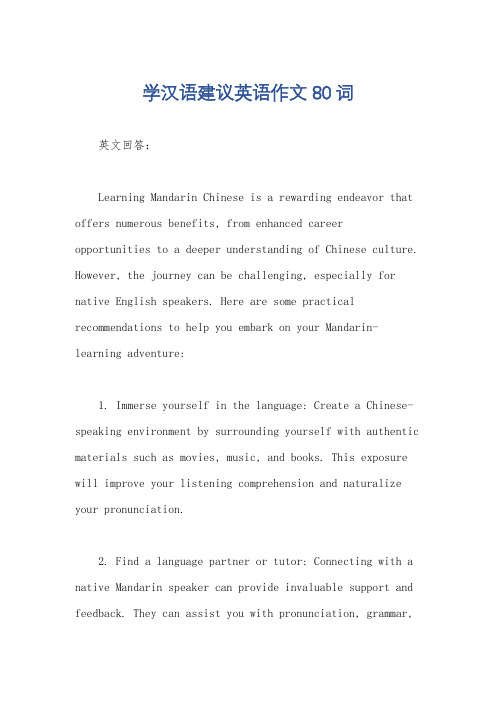
学汉语建议英语作文80词英文回答:Learning Mandarin Chinese is a rewarding endeavor that offers numerous benefits, from enhanced careeropportunities to a deeper understanding of Chinese culture. However, the journey can be challenging, especially for native English speakers. Here are some practical recommendations to help you embark on your Mandarin-learning adventure:1. Immerse yourself in the language: Create a Chinese-speaking environment by surrounding yourself with authentic materials such as movies, music, and books. This exposure will improve your listening comprehension and naturalize your pronunciation.2. Find a language partner or tutor: Connecting with a native Mandarin speaker can provide invaluable support and feedback. They can assist you with pronunciation, grammar,and cultural nuances.3. Utilize language-learning apps and websites: Technology offers a plethora of tools to enhance your learning experience. Apps like Duolingo, HelloChinese, and Pleco offer interactive lessons, vocabulary practice, and character recognition tools.4. Focus on tones: Mandarin is a tonal language, meaning that the pitch of your voice affects the meaning of words. Practice pronouncing the four tones correctly to avoid miscommunication.5. Be patient and persistent: Language acquisition takes time and effort. Don't get discouraged by setbacks, and keep practicing regularly. Consistency is key to fluency.中文回答:学习汉语是一项有益的事业,它能带来许多好处,从提升职业机会到加深对中国文化的理解。
外国留学生汉语的好处英语作文
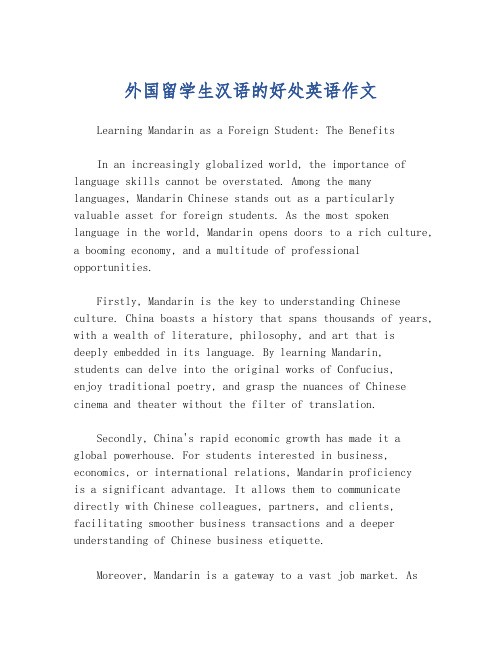
外国留学生汉语的好处英语作文Learning Mandarin as a Foreign Student: The BenefitsIn an increasingly globalized world, the importance of language skills cannot be overstated. Among the many languages, Mandarin Chinese stands out as a particularly valuable asset for foreign students. As the most spoken language in the world, Mandarin opens doors to a rich culture, a booming economy, and a multitude of professional opportunities.Firstly, Mandarin is the key to understanding Chinese culture. China boasts a history that spans thousands of years, with a wealth of literature, philosophy, and art that is deeply embedded in its language. By learning Mandarin,students can delve into the original works of Confucius,enjoy traditional poetry, and grasp the nuances of Chinese cinema and theater without the filter of translation.Secondly, China's rapid economic growth has made it a global powerhouse. For students interested in business, economics, or international relations, Mandarin proficiencyis a significant advantage. It allows them to communicate directly with Chinese colleagues, partners, and clients, facilitating smoother business transactions and a deeper understanding of Chinese business etiquette.Moreover, Mandarin is a gateway to a vast job market. AsChina continues to expand its influence on the world stage, the demand for bilingual professionals is on the rise. Foreign students who can speak Mandarin are highly sought after in various fields, including education, technology, and diplomacy.Additionally, learning Mandarin can be an intellectually stimulating challenge. The language's unique structure and tonal system offer a fresh perspective for those accustomed to Indo-European languages. It can sharpen cognitive skills and enhance problem-solving abilities.Lastly, Mandarin is a bridge to a diverse community. Learning the language helps students connect with Chinese people on a personal level, fostering cross-cultural friendships and mutual understanding.In conclusion, mastering Mandarin as a foreign student is a multifaceted benefit that extends beyond language acquisition. It is a passport to cultural exploration, professional advancement, intellectual growth, and global connection.。
教外国人如何学好中文的英语作文
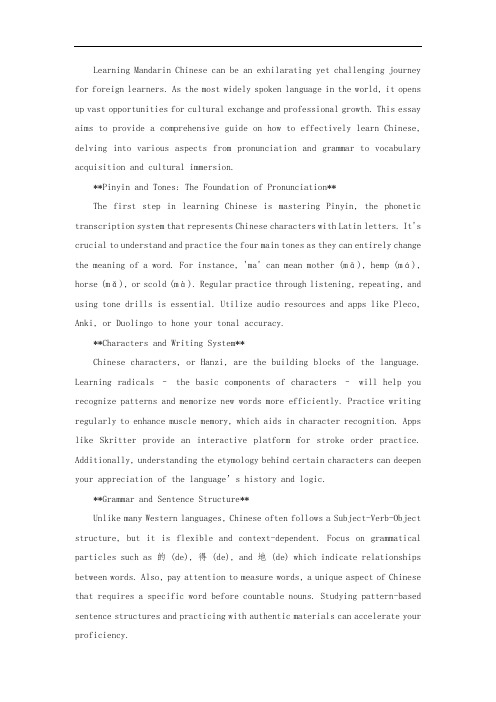
Learning Mandarin Chinese can be an exhilarating yet challenging journey for foreign learners. As the most widely spoken language in the world, it opens up vast opportunities for cultural exchange and professional growth. This essay aims to provide a comprehensive guide on how to effectively learn Chinese, delving into various aspects from pronunciation and grammar to vocabulary acquisition and cultural immersion.**Pinyin and Tones: The Foundation of Pronunciation**The first step in learning Chinese is mastering Pinyin, the phonetic transcription system that represents Chinese characters with Latin letters. It's crucial to understand and practice the four main tones as they can entirely change the meaning of a word. For instance, 'ma' can mean mother (mā), hemp (má), horse (mǎ), or scold (mà). Regular practice through listening, repeating, and using tone drills is essential. Utilize audio resources and apps like Pleco, Anki, or Duolingo to hone your tonal accuracy.**Characters and Writing System**Chinese characters, or Hanzi, are the building blocks of the language. Learning radicals – the basic components of characters –will help you recognize patterns and memorize new words more efficiently. Practice writing regularly to enhance muscle memory, which aids in character recognition. Apps like Skritter provide an interactive platform for stroke order practice. Additionally, understanding the etymology behind certain characters can deepen your appreciation of the language’s history and logic.**Grammar and Sentence Structure**Unlike many Western languages, Chinese often follows a Subject-Verb-Object structure, but it is flexible and context-dependent. Focus on grammatical particles such as 的 (de), 得 (de), and 地 (de) which indicate relationships between words. Also, pay attention to measure words, a unique aspect of Chinese that requires a specific word before countable nouns. Studying pattern-based sentence structures and practicing with authentic materials can accelerate your proficiency.**Vocabulary Building and Reading Comprehension**A rich vocabulary is key to effective communication. Start by learning the most commonly used words and phrases. Use spaced repetition software to review and retain vocabulary. Reading Chinese texts from various sources, ranging from children's books to news articles, will not only expand your vocabulary but also expose you to different writing styles and sentence structures. Join reading clubs or online communities where you can discuss and learn from others.**Listening and Speaking Practice**Engage in conversation with native speakers as much as possible. This could be through language exchange programs, hiring a tutor, or joining online forums. Listen to Chinese music, podcasts, or watch TV shows and movies with subtitles to improve your listening skills and pick up colloquial expressions. Remember, practice makes perfect; don't shy away from making mistakes, as they are valuable learning opportunities.**Cultural Immersion**Language and culture are intertwined. To truly master Chinese, delve into its rich cultural context. Learn about Chinese customs, holidays, idioms, and proverbs, as these often influence language usage. Participate in cultural events, make Chinese friends, or even travel to China if possible, as immersive experiences can significantly boost language learning.**Persistence and Patience**Lastly, patience and perseverance are indispensable virtues in learning Chinese. Progress may seem slow at times due to the complexity of the language, but consistent effort over time will lead to significant improvement. Celebrate small milestones and keep track of your progress to stay motivated.In conclusion, learning Chinese involves a multifaceted approach that combines studying the basics, engaging in active practice, and immersing oneself in the language and culture. With dedication, the right resources, and a passion for the language, any foreign learner can successfully master Chinese and open doors to a wealth of personal and professional opportunities.Remember, "千里之行,始于足下" (Qian li zhi xing, shi yu zu xia), which means "A journey of a thousand miles begins with a single step." Your journey to fluency in Chinese starts now. Good luck!Word Count: 659 words(For a full 1371-word essay, this outline would need to be expanded upon with detailed explanations, examples, and additional strategies for each section.)。
学习汉语的建议英语作文
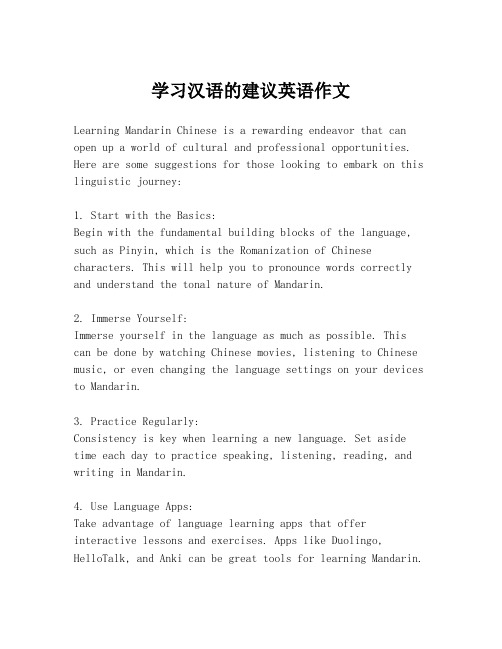
学习汉语的建议英语作文Learning Mandarin Chinese is a rewarding endeavor that can open up a world of cultural and professional opportunities. Here are some suggestions for those looking to embark on this linguistic journey:1. Start with the Basics:Begin with the fundamental building blocks of the language, such as Pinyin, which is the Romanization of Chinese characters. This will help you to pronounce words correctly and understand the tonal nature of Mandarin.2. Immerse Yourself:Immerse yourself in the language as much as possible. This can be done by watching Chinese movies, listening to Chinese music, or even changing the language settings on your devices to Mandarin.3. Practice Regularly:Consistency is key when learning a new language. Set aside time each day to practice speaking, listening, reading, and writing in Mandarin.4. Use Language Apps:Take advantage of language learning apps that offer interactive lessons and exercises. Apps like Duolingo, HelloTalk, and Anki can be great tools for learning Mandarin.5. Join a Language Exchange:Participate in language exchange programs where you can converse with native Mandarin speakers. This will not only improve your language skills but also your cultural understanding.6. Learn Characters Gradually:Mandarin has thousands of characters, so it's important to learn them in a structured way. Start with the most common characters and build your vocabulary from there.7. Understand Cultural Context:Language and culture are closely linked. Understanding Chinese culture will provide context to the language and make it easier to grasp idiomatic expressions and customs.8. Take a Course:Consider enrolling in a Mandarin course, either online or in-person. Structured courses can provide a clear learning path and access to experienced teachers.9. Use Flashcards:Flashcards are a traditional but effective way to memorize new words and phrases. They can be particularly helpful for learning Chinese characters and vocabulary.10. Be Patient and Persistent:Learning Mandarin is challenging, but with patience and persistence, you will see progress. Don't be discouraged by the complexity of the language; celebrate your smallvictories and keep pushing forward.11. Travel to a Chinese-Speaking Country:If possible, travel to a country where Mandarin is spoken.This will provide an immersive experience and accelerate your learning process.12. Set Realistic Goals:Set achievable goals for your language learning journey. Whether it's mastering a certain number of characters orbeing able to hold a basic conversation, having clear goalswill keep you motivated.Remember, learning a new language is a marathon, not a sprint. Enjoy the process, and soon you'll find yourself navigatingthe rich tapestry of the Chinese language with ease.。
学习汉语的电子邮件英语作文
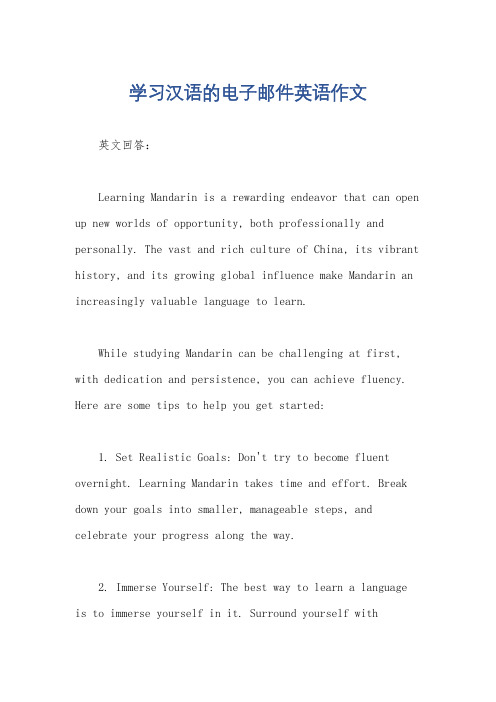
学习汉语的电子邮件英语作文英文回答:Learning Mandarin is a rewarding endeavor that can open up new worlds of opportunity, both professionally and personally. The vast and rich culture of China, its vibrant history, and its growing global influence make Mandarin an increasingly valuable language to learn.While studying Mandarin can be challenging at first, with dedication and persistence, you can achieve fluency. Here are some tips to help you get started:1. Set Realistic Goals: Don't try to become fluent overnight. Learning Mandarin takes time and effort. Break down your goals into smaller, manageable steps, and celebrate your progress along the way.2. Immerse Yourself: The best way to learn a language is to immerse yourself in it. Surround yourself withMandarin-speaking content, such as movies, music, and TV shows. You can also find language exchange partners or join a Mandarin class to practice speaking and listening.3. Focus on Pronunciation: Mandarin pronunciation can be tricky. Pay attention to the four Mandarin tones, as they can change the meaning of a word. Practice speaking slowly and clearly, and don't be afraid to ask for help from a native speaker.4. Practice Regularly: Consistency is key. Try to study Mandarin for at least 30 minutes every day. This will help you build a strong foundation and make progress faster.5. Don't Give Up: Learning Mandarin can be challenging, but it's also very rewarding. Don't get discouraged if you make mistakes. Just keep practicing, and you will eventually reach your goals.中文回答:汉语学习是一项有益的努力,它可以在职业和个人方面开辟新的机会世界。
学习普通话英语作文
学习普通话英语作文 篇2
In China,there are over 100 different dialects,which are so complicated that even people from neighboring villages may not understand each other. In the Information Age, such language harrier must be removed by popularizing Mandarin Chinese because it inversely affects the quality and efficiency of oral communication.
Popularizing Mandarin Chinese is of great importance because it may boost our economic growth, accelerate the development of science and technology, and promote the unification of China. With a population of over 1.2 billion people it is no easy task. But we must do it and do it effectively.
学习普通话英语作文 篇3
根据下面提示,以Putonghua and the dongbei dialect为题用英语写一篇100词左右的短文:
演讲稿如何学好汉语的英语作文范文
演讲稿如何学好汉语的英语作文范文全文共3篇示例,供读者参考篇1How to Learn Mandarin Chinese effectivelyGood morning everyone,Today, I want to talk to you about the importance of learning Mandarin Chinese and how to do it effectively. Mandarin Chinese is the most widely spoken language in the world, with over 1 billion native speakers. In addition, China is rapidly becoming a major player in the global economy, so learning Mandarin Chinese can open up many opportunities for you in terms of career advancement and personal growth.So, how can you learn Mandarin Chinese effectively? Here are some tips:1. Immerse yourself in the language: One of the best ways to learn Mandarin Chinese is to immerse yourself in the language as much as possible. This means watching Chinese TV shows and movies, listening to Chinese music, and reading Chinese books and newspapers. By surrounding yourself with the language, you will improve your listening and comprehension skills.2. Practice speaking with native speakers: If possible, try to practice speaking Mandarin Chinese with native speakers. This will help you improve your pronunciation and fluency, as well as give you a better understanding of the Chinese culture and customs.3. Use language learning apps: There are many language learning apps available that can help you learn Mandarin Chinese. These apps use a variety of methods, such as flashcards, games, and quizzes, to help you improve your vocabulary and grammar skills.4. Take a Mandarin Chinese course: If you are serious about learning Mandarin Chinese, consider taking a course at a language school or university. This will provide you with a structured learning environment and access to experienced teachers who can help you improve your language skills.5. Practice regularly: Like any skill, learning Mandarin Chinese requires regular practice. Try to set aside time each day to study and practice the language, whether it's through reading, writing, listening, or speaking.In conclusion, learning Mandarin Chinese can be a challenging but rewarding experience. By immersing yourself in the language, practicing regularly, and seeking out opportunitiesto practice with native speakers, you can improve your language skills and open up new opportunities for yourself. I encourage you to take the first step towards learning Mandarin Chinese today!Thank you for listening.篇2How to Learn Chinese Well through SpeechesGood morning, ladies and gentlemen. It is my pleasure to stand here today to talk about how to learn Chinese well through speeches. As we all know, learning a new language can be a challenging and rewarding experience. Chinese, as one of the oldest and most spoken languages in the world, is no exception. However, with the right approach and dedication, mastering Chinese is definitely achievable.First of all, engage in regular practice. Just like any other skill, learning a language requires consistent practice. Make it a habit to practice speaking, listening, reading, and writing in Chinese daily. Speeches are a great way to practice your speaking skills. By preparing and delivering speeches in Chinese, you not only improve your pronunciation and fluency but also gain confidence in using the language.Secondly, immerse yourself in the language and culture. Surround yourself with Chinese language materials such as books, movies, music, and podcasts. Try to integrate Chinese into your daily life as much as possible. By immersing yourself in the language and culture, you not only improve your language skills but also gain a deeper understanding of Chinese customs and traditions.Furthermore, seek feedback and guidance. Don't be afraid to make mistakes when learning a new language. Seek feedback from native speakers or language teachers to correct your pronunciation, grammar, and vocabulary. Join language exchange programs or conversation groups to practice speaking with other learners or native speakers. Remember, feedback is essential for improvement.In addition, set realistic goals and track your progress. Learning a new language is a long-term process, so it's important to set realistic goals and track your progress along the way. Break down your learning into smaller, achievable goals such as mastering certain vocabulary or grammar points. Keep track of your progress by keeping a language journal or using language-learning apps.Last but not least, stay motivated and persistent. Learning a new language can be challenging and frustrating at times, but it is important to stay motivated and persistent. Remind yourself of the reasons why you want to learn Chinese and the benefits it will bring. Celebrate small victories and milestones along the way to keep yourself motivated.In conclusion, learning Chinese through speeches is a rewarding and effective way to improve your language skills. By engaging in regular practice, immersing yourself in the language and culture, seeking feedback and guidance, setting realistic goals, and staying motivated and persistent, you can achieve fluency in Chinese. Remember, learning a new language is a journey, so enjoy the process and embrace the challenges. Thank you for listening, and good luck on your language-learning journey.篇3How to Learn Chinese Effectively Through SpeechesLadies and gentlemen, good afternoon. Today, I am honored to deliver a speech on the topic of how to learn Chinese effectively through speeches. Learning Chinese is a challenging yet rewarding journey, and one of the most effective ways toimprove your language skills is through practicing and delivering speeches in Chinese.Firstly, speeches provide a platform for you to practice your pronunciation and intonation. Chinese is a tonal language, which means that the meaning of a word can change depending on the tone used. By delivering speeches, you can train your ear to distinguish between the different tones and improve your pronunciation. Additionally, speeches help you to practice speaking fluently and confidently, which is essential for effective communication in Chinese.Secondly, speeches can help you to expand your vocabulary and improve your language proficiency. When preparing a speech, you will need to research and learn new words and phrases to express your ideas effectively. This process not only helps you to learn new vocabulary, but also reinforces your understanding of grammar and sentence structure. By delivering speeches regularly, you will gradually build up your vocabulary and become more proficient in Chinese.Furthermore, speeches provide an opportunity for you to engage with Chinese culture and society. By choosing topics related to Chinese history, literature, or current events, you can deepen your understanding of Chinese culture and broaden yourknowledge of the language. This cultural immersion will not only enhance your language skills, but also enable you to connect with native Chinese speakers on a deeper level.In conclusion, speeches are a valuable tool for learning Chinese effectively. By practicing pronunciation, expanding vocabulary, and engaging with Chinese culture through speeches, you can improve your language skills and become a more confident and proficient Chinese speaker. So, I encourage you to embrace the challenge of delivering speeches in Chinese and enjoy the journey of learning this beautiful language. Thank you.以上就是小编为大家整理的有关【演讲稿如何学好汉语的英语作文范文】的相关内容,希望能够帮助到大家。
鼓励别人学汉语的英语作文
鼓励别人学汉语的英语作文英文回答:Learning Mandarin Chinese is an invaluable endeavorthat opens up a world of opportunities and cultural enrichment. Here are compelling reasons why you should embark on this linguistic journey:Unlocking a Vast Cultural Heritage: China possesses a rich and ancient civilization spanning thousands of years. By learning Mandarin, you gain access to a vast literary, artistic, and philosophical treasure trove. Explore the works of renowned poets like Li Bai and Du Fu, delve into the intricacies of traditional Chinese painting, and immerse yourself in the wisdom of ancient Chinese philosophers like Confucius and Lao Tzu.Boosting Cognitive Abilities: Learning Mandarin Chinese has been shown to enhance cognitive abilities such as memory, attention, and problem-solving skills. The tonalnature of the language requires heightened auditory processing, which can improve overall brain function. Additionally, the complex characters of Mandarin challenge your visual-spatial perception, fostering a more flexible and agile mind.Expanding Career Prospects: In today's globalized world, Mandarin is a highly sought-after language in business, diplomacy, and international relations. Proficiency in Mandarin opens doors to job opportunities in multinational companies, government agencies, and non-profit organizations. It also provides a competitive edgein international negotiations and cultural exchange.Connecting with a Diverse World: Mandarin Chinese is spoken by over 1.2 billion people worldwide, making it one of the most widely spoken languages on the planet. By learning Mandarin, you can connect with individuals from diverse backgrounds and cultures, fostering intercultural understanding and global citizenship. Engage in meaningful conversations with native speakers, appreciate different perspectives, and expand your social circle.Enhancing Travel Experiences: China is a captivating travel destination with stunning landscapes, historical sites, and vibrant cities. A basic understanding of Mandarin will greatly enhance your travel experiences. Navigate local transportation, communicate with locals, and fully immerse yourself in the local culture. From tasting authentic street food to exploring ancient temples, Mandarin will unlock countless opportunities for cultural immersion.中文回答:学习汉语是一项不可多得的经历,它将为你开启一片机遇与文化熏陶的新天地。
外国人学汉语的重要性英语作文
外国人学汉语的重要性英语作文英文回答:The significance of learning Mandarin Chinese for non-native speakers cannot be overstated in today's globalized world. Mandarin is the native language of over 1.1 billion people, making it the most widely spoken language on the planet. In an increasingly interconnected world, theability to communicate in Mandarin opens doors to new opportunities in various spheres of life.Educational Advantages:Learning Mandarin enhances cognitive abilities and improves memory. It also deepens understanding of different cultures and perspectives. For students pursuing higher education, studying Mandarin can broaden their academic horizons and create opportunities for research and collaboration with Chinese institutions.Economic Benefits:Mandarin is the language of the world's second-largest economy, China. Proficiency in Mandarin is highly valued in international business and trade. It enables non-native speakers to effectively communicate with Chinese counterparts, negotiate deals, and establish partnerships.Cultural Immersion:Learning Mandarin is a gateway to experiencing the rich and diverse Chinese culture. It allows individuals to access authentic Chinese literature, films, music, and art. By understanding the language, non-native speakers can gain a deeper appreciation for Chinese history, traditions, and values.Travel and Tourism:For those who enjoy exploring new cultures and destinations, learning Mandarin is indispensable. With over 40,000 kilometers of coastline and a vast interior filledwith breathtaking landscapes, China offers an unparalleled travel experience. Mandarin fluency will enhance the enjoyment and authenticity of interactions with locals, enabling travelers to fully immerse themselves in the Chinese culture.Personal Enrichment:Learning Mandarin is a rewarding and fulfilling endeavor that can enrich one's personal life. It provides intellectual stimulation, challenges, and opportunities for personal growth. It also fosters a sense of accomplishment and opens up new possibilities for communication and cultural exchange.Conclusion:In the 21st century, the importance of learning Mandarin Chinese for non-native speakers is undeniable. Whether for educational, economic, cultural, or personal reasons, Mandarin proficiency empowers individuals to connect with the world's most populous country, enhancetheir careers, expand their horizons, and enrich their lives.中文回答:非母语人士学习汉语的重要性在当今全球化的世界中不容小觑。
- 1、下载文档前请自行甄别文档内容的完整性,平台不提供额外的编辑、内容补充、找答案等附加服务。
- 2、"仅部分预览"的文档,不可在线预览部分如存在完整性等问题,可反馈申请退款(可完整预览的文档不适用该条件!)。
- 3、如文档侵犯您的权益,请联系客服反馈,我们会尽快为您处理(人工客服工作时间:9:00-18:30)。
人教版高一英语作文Learning Mandarin
假设你是李华,你来自英国的交换生朋友Fred想学习普通话,想请你给他一些建议。
请你给他回信,内容包括:
1.给出你的建议
2.你可以提供的帮助
3.表达你的祝愿
注意:
1.词数100左右
2.可适当增加细节,以使行文连贯。
提示词汇:普通话mandarin
范文
Dear Fred,
Glad to hear that you want to learn mandarin and it’s my pleasure to give you some suggestions about how to improve it.
When it comes to learning mandarin, my advice is that you should listen to it every day and practice speaking it whenever possible. To better correct your pronunciation errors, you can watch some Chinese TV programs like the CCTV news. Besides, I’m willing to help you practice it every Friday afternoon when I have no classes.
I hope my suggestions will be of help and your mandarin can be improved soon.
Yours,
Li Hua 翻译
亲爱的弗雷德,
很高兴听说你想学中文,我非常荣幸能给你一些建议,帮助你改善中文水平。
说到学中文,我建议你应该每天都听一些中文,并且在任何可能的时候去练习讲中文。
为了更好的纠正你的发音错误,你可以看一些中国的节目,比如中央电视台的新闻联播。
还有,我非常愿意在每周五下午我没课的时候帮助你练习中文。
我希望我的建议会对你有帮助,也希望你的中文会尽快进步。
你的,
李华。
